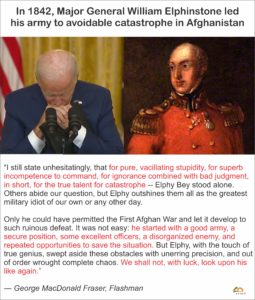powered by Surfing Waves
Take your pick:
Those who do not learn history are doomed to repeat it
— George Santayana
_______
Those that fail to learn from history are doomed to repeat it
— Churchill
_______
.

On January 6, 1842, a British Army under the command of Major General William Elphinstone began its disastrous retreat from Kabul. Elphinstone threw away every advantage and lost his entire army.
.
.
On 13 January, a British officer from the 16,000 strong column rode into Jalalabad on a wounded horse (a few sepoys, who had hidden in the mountains, followed in the coming weeks). The sole survivor of the 12-man cavalry group, assistant Surgeon William Brydon, was asked upon arrival what happened to the army, to which he answered “I am the army.” Although part of his skull had been sheared off by a sword, he ultimately survived because he had insulated his hat with a magazine which deflected the blow. Brydon later published a memoir of the death march. The pony he rode was said to have lain down in a stable and never got up.
The Last Stand
Doctor Brydon arrives alone in Jalalabad
* This article was originally published here
powered by Surfing Waves
HELP STOP THE SPREAD OF FAKE NEWS!
SHARE our articles and like our Facebook page and follow us on Twitter!






0 Comments